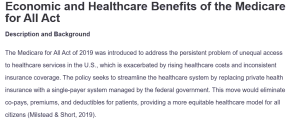Economic and Healthcare Benefits of the Medicare for All Act
Description and Background
The Medicare for All Act of 2019 was introduced to address the persistent problem of unequal access to healthcare services in the U.S., which is exacerbated by rising healthcare costs and inconsistent insurance coverage. The policy seeks to streamline the healthcare system by replacing private health insurance with a single-payer system managed by the federal government. This move would eliminate co-pays, premiums, and deductibles for patients, providing a more equitable healthcare model for all citizens (Milstead & Short, 2019).
Social Determinant Impact
One of the most impacted social determinants is economic stability since the policy in question touches on the aspect of finance of accessing healthcare services. This, in turn, will have positive impacts on the health advising population, especially those with the least earning capacities, through a rational out-of-pocket expenditure ratio.
Evidence Base
The evidence base supporting this policy comes from various studies on healthcare systems in other countries, which show that single-payer systems can lead to lower healthcare costs and improved health outcomes (Sorum et al., 2023). For example, a study on the comparison of the unit cost in the U.S. to other OECD countries with health care policies such as universal health care has indicated that the development of such policies lowers the overall unit cost as well the general physiological well-being of the population (Gunja et al., 2023). Furthermore, Medicare data shows that the current coverage of only older people is proof that the system can cover the entire population (Jacobson et al., 2024).
In addition, Sorum et al. (2023) demonstrate that expanding Medicare could reduce administrative overheads, which account for a significant portion of healthcare spending in the current system. Research has also demonstrated that extending the payment’s functions into a single, more efficacious system helps to direct more resources to the patient’s side. Moreover, the policy could minimize health gaps because people with low incomes who cannot afford healthcare services will always get the needed services under the policy (Sorum et al., 2023). This ought to lead to improved health and foster the downward spiral of long-term healthcare costs for the country.
Conclusion
There is strong evidence, including the proposed Medicare for All Act, showing how to reduce the financial obstacles to healthcare access. However, in enacting such a radical change, assessing a policy’s economic and administrative implications for the existing and future healthcare system is crucial.
References
Gunja, M. Z., Gumas, E. D., & Williams II, R. D. (2023, January 31). U.S. health care from a global perspective, 2022: Accelerating spending, worsening outcomes. The Commonwealth Fund. https://doi.org/10.26099/8ejy-yc74
Jacobson, G., Leonard, F., Sciupac, E., & Rapoport, R. (2024, February 22). What do Medicare beneficiaries value about their coverage?: Findings from the Commonwealth Fund 2024 Value of Medicare Survey. The Commonwealth Fund. https://doi.org/10.26099/gq43-qs40
Milstead, J. A., & Short, N. M. (2019). Health policy and politics: A nurse’s guide (6th ed.). Jones & Bartlett Learning.
Sorum, P. C., Stein, C., & Moore, D. (2023). “Comprehensive healthcare for America”: Using the insights of behavioral economics to transform the U.S. healthcare system. Journal of Law Medicine & Ethics, 51(1), 153–171. https://doi.org/10.1017/jme.2023.52
ORDER A PLAGIARISM-FREE PAPER HERE
We’ll write everything from scratch
Question 
When politics and medical science intersect, there can be much debate. Sometimes anecdotes or hearsay are misused as evidence to support a particular point. Despite these and other challenges, however, evidence-based approaches are increasingly used to inform health policy decision-making regarding causes of disease, intervention strategies, and issues impacting society. One example is the introduction of childhood vaccinations and the use of evidence-based arguments surrounding their safety.

Economic and Healthcare Benefits of the Medicare for All Act
In this Discussion, you will identify a recently proposed health policy and share your analysis of the evidence in support of this policy.
To prepare:
- Review the Congress website provided in the Resources and identify one recent (within the past 5 years) proposed health policy.
- Review the health policy you identified and reflect on the background and development of this health policy.
Paper:
- Post a description of the health policy you selected and a brief background for the problem or issue being addressed. Which social determinant most affects this policy? Explain whether you believe there is an evidence base to support the proposed policy and explain why. Be specific and provide examples.
- Milstead, J. A., & Short, N. M. (2019). Health policy and politics: A nurse’s guide (6th ed.). Burlington, MA: Jones & Bartlett Learning.]
- https://www.congress.gov/